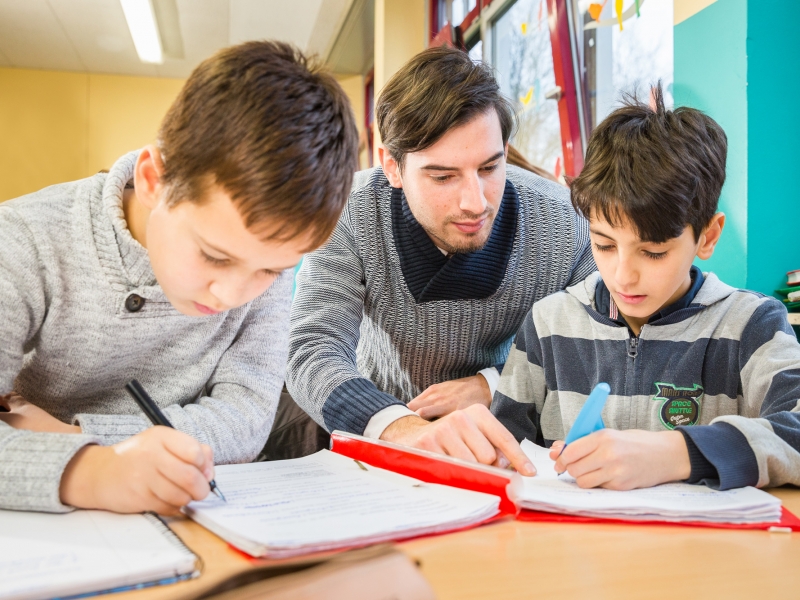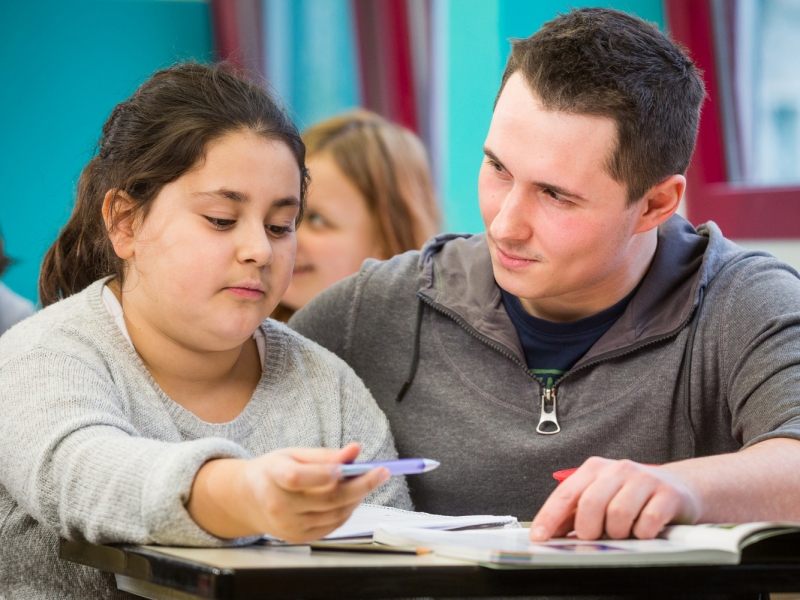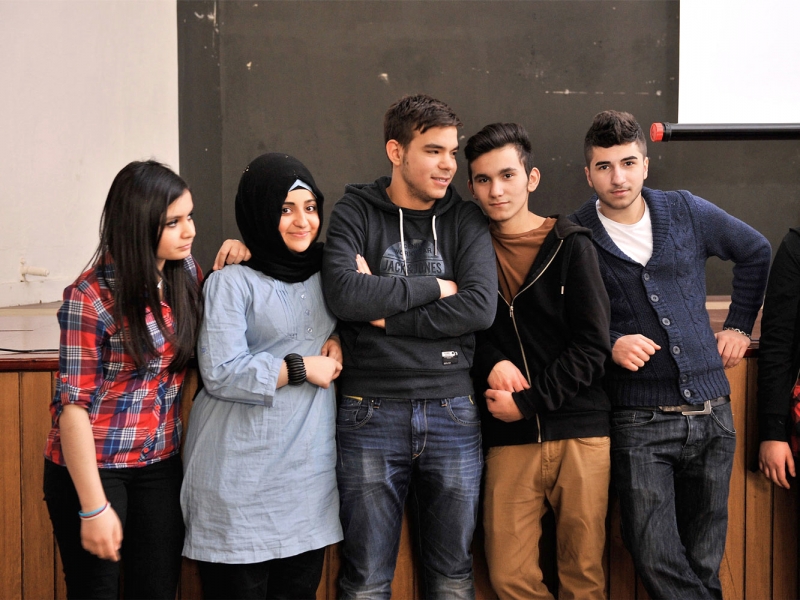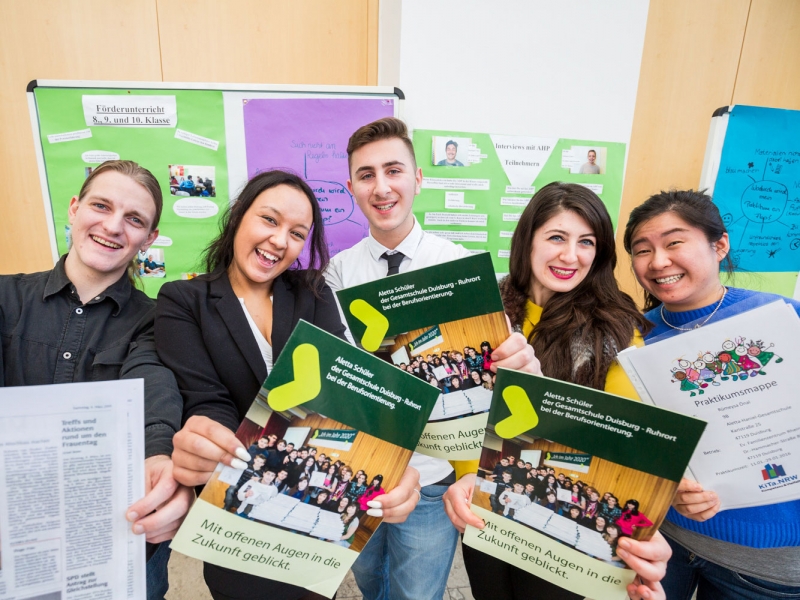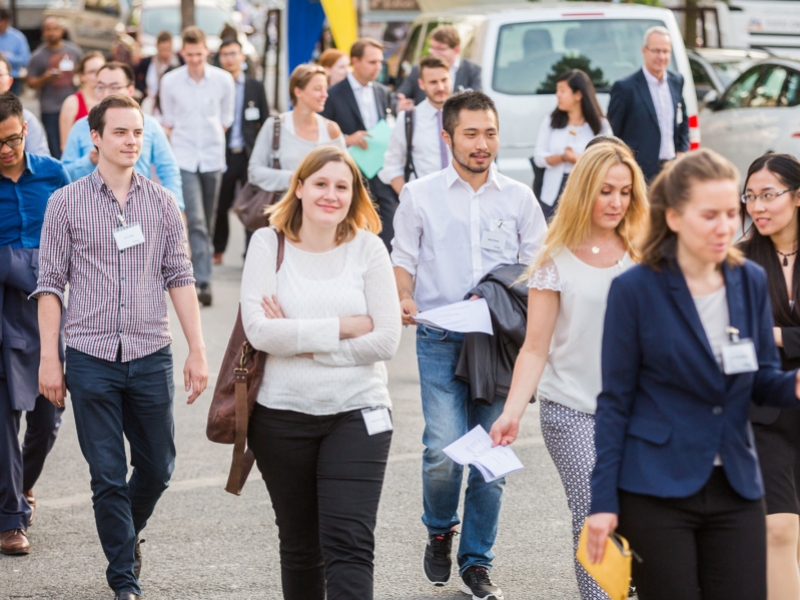
Education as an opportunity
Helping pupils – providing opportunities
At Theodor König Comprehensive School, an integrated comprehensive school in Duisburg, Haniel Foundation project »Education as an Opportunity« has brought together supporters of different approaches. Here, they all work together to support the integration of disadvantaged pupils into the everyday school routine.
Today, Maria, Vasile, and Vanesse are tackling the letter F. Slowly, they are drawing Fs onto their sheets of paper. Marga, on the other hand, prefers to read out loud: » ... ho ... ous ... house«. »Great, Marga«, says Severin Thoma, »Now let’s do a bit of writing, ok?« The eleven-year-old sighs, nods and grabs a pen.
It is a German class at Theodor König Comprehensive School, an inte- grated comprehensive school in Duisburg – Beeck. As on every Tuesday morning, Teach First fellow Severin Thoma is intensively practicing German with just under 20 kids from the »lateral entrants class«. All these pupils are refugees from Syria, Serbia, Bulgaria, Romania, Iraq, or Croatia. Some of them are having to start at the very beginning, others are already attempting short dialogues. »What are your hobbies?« »I like playing soccer.«
Without the support of Severin Thoma, Brita Dannehl, the class’s regular teacher, would hardly be able to adequately support this diverse group of kids. Sometimes Thoma gathers some of the kids into a literacy group for extra exercises, other times he is there to discuss the kids’ progress with Dannehl, sometimes they form a team to consult with parents during teacher-parent day, and other times Thoma hooks pupils up with the support organisation Chancenwerk, whose professional private tutors visit the school twice a week. »Getting so much intensive support from external partners is something of dream come true«, says Dannehl. »It’s really helping the kids here.«
As schools go, Theodor König Comprehensive School is typical for the deprived Duisburg district of Beeck. 80 per cent of all pupils come from a Turkish migration background, 66 per cent need extra language training. The German pupils also come from underprivileged educational backgrounds. »Practically all the kids here are disadvantaged«, says the school’s principal, Dirk Winkelmann. »They’re all growing up in difficult circumstances«. Chances of entering a successful educational career are slim.
That is why three years ago Winkelmann answered with a resounding »yes!« when Chancenwerk offered to provide support to the pupils with its finely-tuned private tuition programme, »yes« again a year later when Teach First Germany agreed to send the first top university graduate to the school as pedagogical support; one more »yes« a year ago when the Apeiros Institute joined, an organisation specializing in bringing school drop-outs back to the classroom. The important point in all this is that these three social enterprises do not work in isolation from each other – as is often the case in education – but are instead systematically dovetailing their work.
The reason this works so well lies with the partnership project »Education as an Opportunity«, initiated in 2010 by the venerable Duisburg family enterprise Haniel. »Taking on responsibility for the social development in their home town is very important to this entrepre neurial family«, says Dr Rupert Antes, Executive Director of the Haniel Foundation. The foundation has been running and developing the programme since 2013. Its aim is to improve educational opportunities. After all, nowhere in the Ruhr area do as many kids drop out of school as in Duisburg. Seven per cent leave school without graduating; among foreign pupils, the percentage is nearly double that. Refugees are experiencing even more difficulties.
© Alexander Muchnik
Learning a new language: Teach First helps children learn German.
There are, of course, dozens of excellent initiatives and projects aimed at helping disadvantaged pupils with their learning. But often, their work remains patchwork, disconnected and unsustainable. After all, it is nigh impossible to live up to the complex challenges of the education system. Therefore, the initiators of »Education as an Opportunity« asked themselves five years ago: »How about bringing the most important players in Duisburg to one table?« The city’s education experts, Ashoka – an organisation that supports social entrepreneurs in municipalities – as well as three social enterprises, Teach First Deutschland, Chancenwerk, and Apeiros, each of which follows a different approach to improving educational opportunities in the region’s schools. »We want to establish an education chain and reach more pupils by way of collective impact«, says Antes, in order for the different measures to dovetail and thereby provide optimum support for disadvantaged pupils.
Thoma is on location full-time. Lucas Sauerborn from Chancenwerk comes in only twice a week. »Regular exchange is all the more important«, they both say. How are the kids doing? What is happening in the classrooms? In which areas do teachers want support? Who needs help with their homework and who should have private tutoring? Which of these pupils could actually become private tutors themselves? According to Sauerborn: »Our principle is that of a tutoring chain of sorts. University students help older pupils, and the older pupils help the younger ones.« This keeps costs down. Older pupils do not have to pay extra. For the younger ones, parents have to pay ten Euros a month.
© Alexander Muchnik
Passing on knowledge: Chancenwerk volunteer Lucas Sauerborn tutoring pupil Seyma.
Today Lucas Sauerborn, a biology and German literature student, is practicing the basic rules of picture description with Christopher and Lukas. Prior to that the two ninth-graders helped him with homework supervision for years five to seven. Three afternoons every week around twenty kids get together to puzzle over math, English, German, and chemistry. They do spelling exercises or numbers games. »Together with others, it’s a lot more fun than at home on your own«, says fifth-grader Sadikhan. »I’ve become better at English«, says Tom from sixth grade. Christopher and Lukas, the ninth-graders, also benefit from their job: »It feels good to help the kids and to show them: you can do it!«
Teach First fellow Thoma and Lucas Sauerborn exchange their thoughts with Sven Schneider and his colleagues from Aspeiros, the organisation that uses absenteeism figures, meetings with parents, and home calls to win back school-weary kids. Says Schneider: »While we cannot pass data on specific pupils on to our partners, we can discuss the classroom situation and therefore provide better support.« It helps that Schneider, Sauerborn, and Thoma are able to view everyday school life with the impartial eye of outsiders. »You often see things that the people working in the school don’t even notice«, says Schneider. Sometimes they analyse cases anonymously, consult, and advise each other with a kind of collegial supervision: I was faced with this situation and I’ve dealt with it in this or that way, do you have any other ideas? Sometimes they talk about conversations with teachers, recommending good points of contact among the staff. Says Schneider: »Because we completely trust each other and closely partner with Theodor König Comprehensive School, we can work much more efficiently than at schools where we’re on our own.«
And once a month, when all Duisburg »Education as an Opportunity« team members get together for a network meeting, social entrepreneurs, city representatives, members of Akosha, and the Haniel Foundation develop their concept further: how can we continue to improve our partnerships with schools? How can the collaboration with teachers be optimised? How can we anchor ourselves more firmly in the city? For example, by presenting our project together at the school principals’ conference. »We want the three social enterprises to be perceived as one brand«, Rupert Antes emphasises. »Key to this is a firm anchor in the municipality: Without the support of the city of Duisburg, we wouldn’t have come this far this quickly.«
Principal Winkelmann has long begun to view the trio of organisations as a networking team. »It’s great to see how the three complement each other.« He likes the breath of fresh air they bring into the classroom, their different way of approaching the pupils, the close partnership, and how they provide relief to the staff.
»Education as an Opportunity« aims to reach 70 per cent of Duisburg’s general secondary schools and integrated comprehensive schools. So far, the initiative is active in 18 out of 30 schools. At four of them, all three projects are working together intensively on site, one of them being Theodor König Comprehensive School, making the project one of the largest collective impact projects in Germany. The exact effects of the partnership are currently being examined at the Centre for Social Investment at Heidelberg University as well as at the University of Duisburg-Essen, on commission from the Haniel Foundation. Antes says: »We also want to show other cities that together we can achieve more! Join in! Do what we’re doing!«
Education as an Opportunity
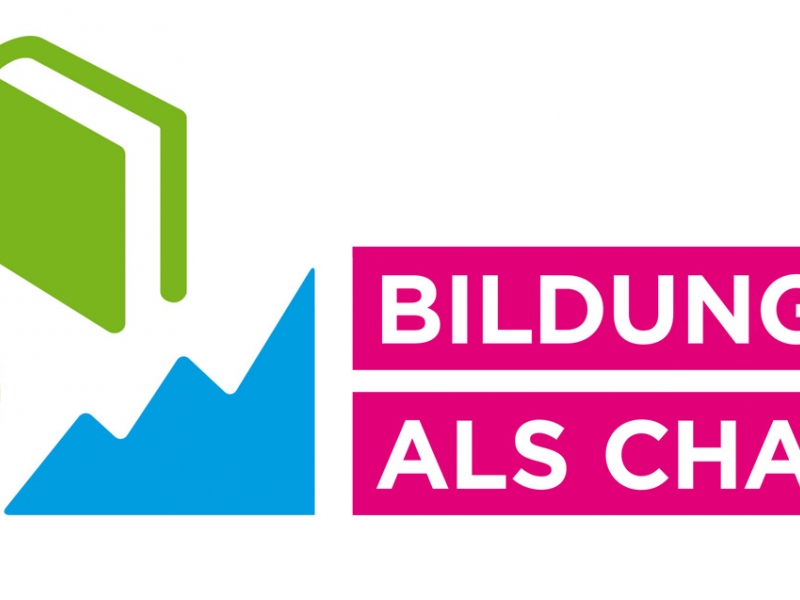
In order to improve the perspectives of young people, three social enterprises – apeiros e.V., Chancenwerk e.V. and Teach First Germany GmbH – joined forces in Duisburg to form the partnership »Education as an Opportunity«. Prior to this, each of the three organisations was involved in helping educationally disadvantaged children and youngsters, each creating a sustainable effect based on their respective entrepreneurial strategy. In the spirit of collective impact, they are now dovetailing their approaches to overcome educational barriers and pave the way for the pupils’ successful professional future together. This includes supporting young refugees at schools. In 2010, Haniel initiated the project »Education as an Opportunity« with the Haniel Foundation. Since 2013, the Haniel Foundation is solely responsible, guiding and coordinating the project in partnership with Ashoka Deutschland GmbH. Labelled by the city of Duisburg as a »flagship project«, the project includes 18 schools and reaches around 1200 pupils today, making it an example for successful partnership between municipalities, civil society, and (social) enterprises.



